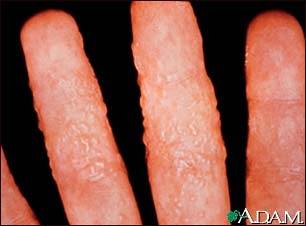Treatment
Keep the skin clean and dry. Over-the-counter antifungal creams, such as those that contain miconazole, clotrimazole, or similar ingredients, are often effective in controlling ringworm.
Severe or chronic infection may need further treatment by your health care provider.
Oral antifungal medications may be used for severe, widespread fungal infections, or an infection that has spread deeper into the skin to the hair follicle. Stronger, prescription topical antifungal medications, such as ketoconazole may be needed. Antibiotics may be needed to treat secondary bacterial infections.
Infected pets should also be treated.
Prognosis (Expectations)
Ringworm usually responds to topical medications within 4 weeks. Severe or resistant cases usually respond quickly to antifungal medicines taken by mouth.
Complications
- Bacterial skin infections, cellulitis
- Skin disorders such as pyoderma or dermatophytid
- Spread of tinea to feet, scalp, groin, or nails
- Whole-body (systemic) side effects of medications
Calling Your Health Care Provider
Call for an appointment with your health care provider if ringworm does not improve with self-care.
Pictures & Images
Dermatitis, reaction to tinea
-
Tinea corporis: Overview, Causes
-
Tinea corporis: Symptoms & Signs, Diagnosis & Tests
-
Tinea corporis: Treatment
Review Date : 10/3/2008
Reviewed By : Kevin Berman, MD, PhD, Atlanta Center for Dermatologic Disease, Atlanta, GA. Review provided by VeriMed Healthcare Network. Also reviewed by David Zieve, MD, MHA, Medical Director, A.D.A.M., Inc.
